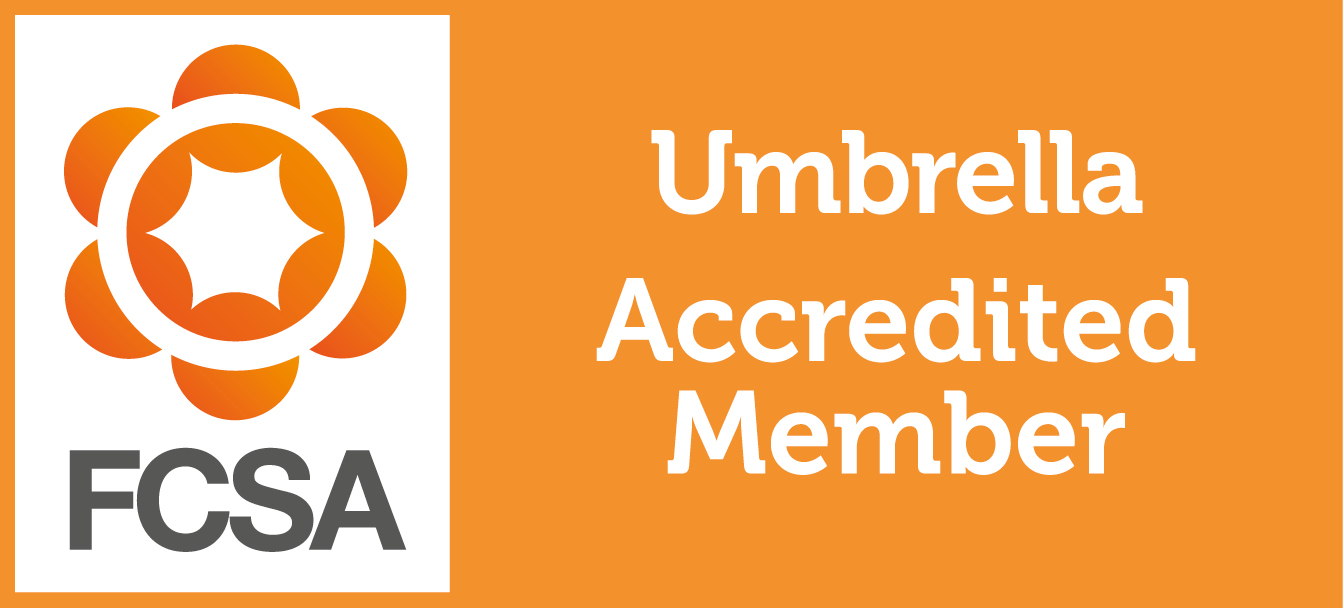
If you’re thinking about starting a contracting career or are moving from a limited company to an umbrella company, we understand you’ll probably have a few queries about how umbrella companies work. Don’t worry – we’re here to help! We’ve summarised the main questions we get asked by contractors to help you decide whether an umbrella company is right for you.
What is an umbrella company?
An umbrella company is a PAYE payroll provider for contractors and freelancers in the UK. When you register with an umbrella company, you will become an employee of theirs, and they will handle everything to do with contracts, payment and administration for you. They are also responsible for ensuring the correct amount of tax and National Insurance Contributions (NICs) are paid to HMRC on your behalf.
How does an umbrella company work?
Using an umbrella company is a straightforward way to operate as a contractor or freelancer. Once you’ve registered, all you need to do is log the hours you have worked via the company’s online portal, app or send your timesheet to their dedicated email address. They will then invoice your agency or end-client for the number of hours you have worked and pay your net salary (minus their weekly/monthly margin, tax deductions and any other applicable deductions) into your personal bank account. You will also receive a payslip for every payment.
Are umbrella companies compliant?
The vast majority of umbrella companies are compliant and exist to offer contractors a legal and reliable way to get paid. However, sadly, as is the case with many industries, some unscrupulous providers advertise tax avoidance schemes and claim to be legitimate. Using a tax avoidance scheme could land you in serious trouble with HMRC, and you could end up owing thousands of pounds in underpaid tax – it isn’t worth the risk.
The best way to ensure you are using a compliant umbrella company is to look for the FCSA accreditation. The FCSA is widely recognised as the industry’s gold standard for compliance and provides assurances to contractors, agencies and end-clients that the umbrella company adheres to UK tax law and HMRC legislation.
How much does it cost to join an umbrella company?
Most compliant umbrella companies will not charge you to join or leave their service. However, umbrella companies will deduct a weekly/monthly margin from your gross salary, which covers their administration and business costs. You can expect an umbrella company’s margin to be anywhere between £15 – £25 per week.
Am I employed or self-employed?
When you register with an umbrella company, you will sign a contract of employment with them, and from that point onwards, you will be an employee of that umbrella company. The umbrella company will also enter into an overarching agreement with your recruitment agency/end-client and sign a contract agreeing to the employment terms. This means that even though the umbrella company employs you, you will complete the work for your end-client.
Do I get statutory benefits?
When you register with an umbrella company, you will sign a contract of employment which means you are entitled to statutory benefits such as Sick Pay and Maternity/Paternity Pay.
Am I insured?
One of the benefits of working via an umbrella company is that Employer’s Liability, Public Liability and Professional Indemnity insurance are included for free as part of the service.
How often will I get paid?
How often you get paid will depend upon the payment schedule set by your agency or end-client, and this is usually weekly, bi-weekly or monthly. The umbrella company will pay you in line with this schedule as soon as they have received funds from your agency or end-client.
What deductions will I see to my take home pay?
This is one of the most commonly asked questions by contractors and freelancers. It is important to understand the difference between the assignment or contract rate and your taxable salary. Your assignment or contract rate is most likely the figure that will have been advertised to you by the end-client or agency. This rate will be invoiced to the agency or end-client and will be paid to the umbrella company. The umbrella company will deduct the employment costs such as the Employers NIC and the Apprenticeship Levy from this rate. The umbrella company will also deduct their margin from the assignment rate as it is more tax-efficient for you.
After these deductions have been made, you are left with your taxable salary. Employees NIC and PAYE tax are then deducted from your taxable salary, and you will be paid your net salary into your personal bank account. When negotiating your contract rate, you must make sure you have considered all these deductions and are satisfied a sufficient uplift has been included. For more information about the umbrella company deductions, please visit our blog.
How does Holiday Pay work through an umbrella company?
As a result of the Harpur Trust versus Brazel case, the Supreme Court ruled that employees who work for part of the year are entitled to the same holiday as employees who work all year. Therefore, workers who work for part of the year should receive 5.6 weeks of annual leave. This judgement applies to employees and workers who work for part of the year under a permanent or continuous contract with irregular hours, such as seasonal workers, term-time only workers, bank staff, zero-hour contracts and workers engaged under recruitment agency or umbrella contracts.
To be consistent with this ruling and to ensure you receive the statutory benefits you are entitled to receive as an employee of an umbrella company, most compliant umbrella companies will calculate your holiday pay at a rate of 25%.
You can opt to have your holiday pay advanced and paid alongside your weekly or monthly salary, or accrued and paid to you at a later date.
Why am I paying Employers NI?
Umbrella companies do not benefit from any of the work you do and exist to offer you a compliant way to get paid. As they only receive a small margin to cover their business and administration costs, they cannot cover employment costs as well. Therefore, the employment costs such as the Employers NI are deducted from the assignment rate: the rate invoiced to the agency or end-client and paid to the umbrella company and not from your taxable salary.
Can you sponsor my Visa?
Visa’s can only be sponsored by the company for whom you will be performing the work for. As umbrella companies are an intermediary in the supply chain of temporary workers, they are not permitted to sponsor visas.
Do you allow travel and subsistence expenses?
The short answer is no. Since 2016, Supervision, Direction and Control (SDC) rules have restricted the tax relief that contractors working through an umbrella company can claim. Many umbrella companies, including Umbrella Company UK, will not allow travel and subsistence expenses, as it is highly unlikely that contractors working through an umbrella company are not subject to SDC.
Do I have to use your pension scheme?
Just like other employers, umbrella companies are legally required to provide and enrol their workers into a workplace pension scheme. However, there is absolutely no obligation for you to use the pension scheme, and you can opt-out if it is not something you are interested in. If you want to opt-out, please notify the pension provider of your decision, and they will action your request; your umbrella company cannot opt-you out on your behalf.
Are you interested in registering with an FCSA accredited Umbrella Company?
Umbrella Company UK has a range of FCSA accredited payroll services, from traditional umbrella PAYE to umbrella specifically for drivers. Our expert team will support you throughout your contracting journey, from initial sign-up through to your contract end.
To find out more about our umbrella services or to begin the registration process, please give us a call on 01707 669023. Alternatively, you can request a call back for a time that suits you, and a member of our team will be in touch.
If you would prefer to request a tailored take home pay calculation, please complete our short umbrella company calculation form.
Updated 31/10/2023.






